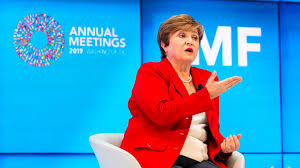Ghana’s three-year, $3 billion Extended Credit Facility (ECF) programme with the International Monetary Fund (IMF) has suffered a significant blow following what the Fund describes as major policy slippages and delays in key reforms.
According to the IMF’s latest review, the country’s performance under the programme “deteriorated markedly” by the end of 2024, raising concerns over the sustainability of economic gains made earlier in the programme.
The IMF’s damning verdict was revealed in its update following the completion of Ghana’s Fourth Review under the ECF programme. The review, which approved a further disbursement of $367 million, bringing total disbursements to approximately $2.3 billion, highlighted that programme implementation had gone off track, particularly in the run-up to Ghana’s 2024 general elections.
“This reflected pre-election fiscal slippages, inflation above program targets though recent data point to renewed rapid disinflation and reform delays,” the IMF noted in its report.
Despite Ghana recording stronger-than-expected economic growth and significant improvement in its external position throughout 2023, these gains were overshadowed by the lapses in policy consistency and delays in structural reforms, especially during the election year. The Fund stressed that these developments had compromised the programme’s goals of stabilizing the economy and building resilience.
Concern
Following the Executive Board’s assessment, IMF Deputy Managing Director Bo Li underscored the seriousness of the situation. “Faced with large policy slippages and reform delays at end-2024, the new administration has taken bold corrective actions to maintain the program on track,” Bo Li stated.
The IMF cautioned that while the Ghanaian authorities have now initiated critical corrective steps, swift and sustained implementation of these measures is essential to restore the credibility and momentum of the programme.
The Fund pointed out that any further deviations could undermine the country’s medium-term economic objectives and damage investor confidence.
Despite the setbacks, Ghana’s macroeconomic outlook has begun showing signs of improvement in recent months. The Ghanaian cedi has appreciated by over 30% against the US dollar, while inflation has dropped sharply to 13.7% as of June 2025.
Additionally, the country’s Gross International Reserves now cover more than four months of imports, indicating improved external stability.
These positive developments have not gone unnoticed. Global credit rating agencies have responded by upgrading Ghana’s Long-Term Foreign-Currency Issuer Default Rating (IDR) outlook, signaling renewed investor confidence.
Government officials say the improvement has paved the way for Ghana’s possible return to the International Capital Market, following the successful reopening of domestic bond issuances.
“We are committed to staying the course with our IMF-backed reforms and ensuring macroeconomic stability for the long haul,” a senior Finance Ministry official disclosed. “The recent disbursement from the IMF is a vote of confidence, but we must deliver results.”
Structural Reforms
One of the core challenges moving forward is the timely implementation of structural reforms that have long been delayed.
These include energy sector restructuring, fiscal consolidation, public debt management, and revenue mobilization. While authorities have promised to accelerate these efforts, the IMF insists that action must match ambition.
Experts warn that Ghana must resist the temptation of slipping back into populist fiscal decisions, particularly as the political landscape evolves after the elections.
“We can’t afford to derail again. Every policy decision must now be scrutinized through the lens of fiscal discipline and economic stability,” said Dr. Elsie Addo Awadzi, a former Bank of Ghana official.
With approximately $700 million still to be disbursed under the ECF programme, the path forward for Ghana is clear but challenging. The IMF has emphasized that continued structural reforms, backed by political will and institutional discipline, will be vital for achieving sustainable growth and long-term stability.


Comments are closed.